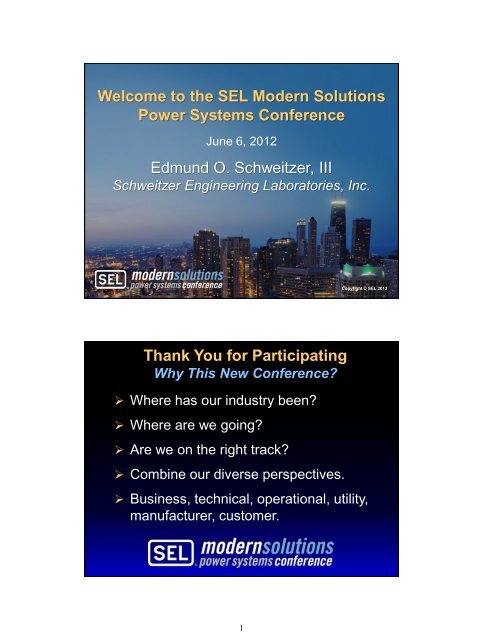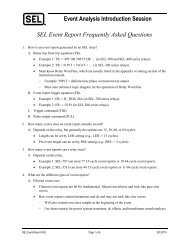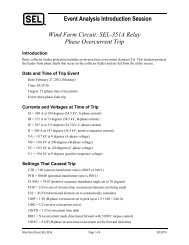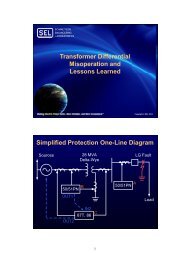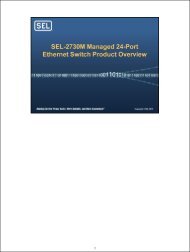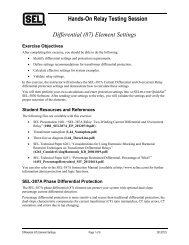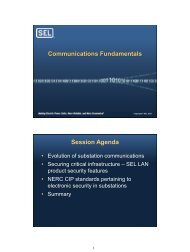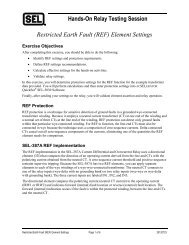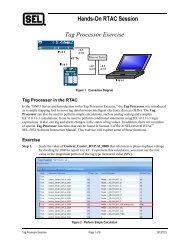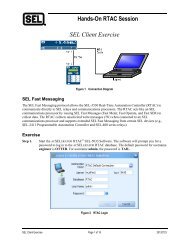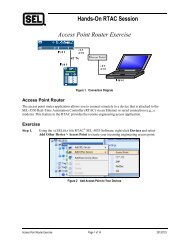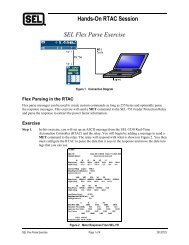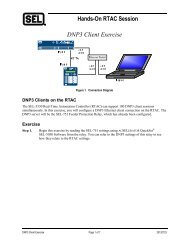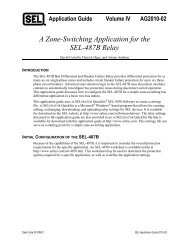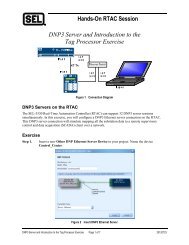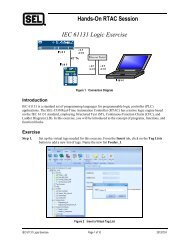Power Systems Conference Edmund O Schweitzer III Thank You for Participating
Welcome to the 2008 SEL Seminar - CacheFly
Welcome to the 2008 SEL Seminar - CacheFly
You also want an ePaper? Increase the reach of your titles
YUMPU automatically turns print PDFs into web optimized ePapers that Google loves.
Welcome to the SEL Modern Solutions<br />
<strong>Power</strong> <strong>Systems</strong> <strong>Conference</strong><br />
June 6, 2012<br />
<strong>Edmund</strong> O. <strong>Schweitzer</strong>, <strong>III</strong><br />
<strong>Schweitzer</strong> Engineering Laboratories, Inc.<br />
Copyright © SEL 2012<br />
<strong>Thank</strong> <strong>You</strong> <strong>for</strong> <strong>Participating</strong><br />
Why This New <strong>Conference</strong>?<br />
‣ Where has our industry been?<br />
‣ Where are we going?<br />
‣ Are we on the right track?<br />
‣ Combine our diverse perspectives.<br />
‣ Business, technical, operational, utility,<br />
manufacturer, customer.<br />
1
Thomas Alva Edison<br />
1847 - 1931<br />
Samuel Insull<br />
1859 - 1938<br />
Chicago Edison Company 1887<br />
‣ First central station at 120 W Adams St<br />
‣ Delivered DC to downtown <strong>for</strong> 30 years<br />
‣ In 1892, Samuel Insull became president<br />
‣ 30 Chicago competitors<br />
‣ Insull led consolidation <strong>for</strong>ming ComEd<br />
2
Adams St. Generating Station<br />
The “Dynamo Room” at Adams Street<br />
Generating Station in Chicago<br />
3
Insull at NELA Convention,<br />
Chicago…June 7, 1898<br />
1. Franchises granted to public-service<br />
corporations should secure them the same<br />
degree of protection in their rights to their<br />
property as is enjoyed by other<br />
investments.<br />
2. Public control of charge <strong>for</strong> service, based<br />
on cost plus a reasonable profit, and<br />
eliminating the factor of competition, is the<br />
proper safeguard <strong>for</strong> the interests of users,<br />
taxpayers, and investors.<br />
114 years ago<br />
Why?<br />
‣ Insull recognized “Capital always gets its pay.”<br />
‣ Our industry is capital-intensive.<br />
‣ Load diversity, e.g., daytime industrial use plus<br />
nighttime illumination, improved use of capital.<br />
‣ Large central stations much more efficient than<br />
small generators.<br />
‣ Sort of a “natural monopoly.”<br />
‣ In exchange <strong>for</strong> monopoly, there needs to be<br />
regulation, like Public Utility Commissions.<br />
4
Conservation<br />
Insull, 1911<br />
We have heard at different times a great deal<br />
about conservation, appealing to the imagination<br />
by talking of making two blades of grass grow<br />
where one grows at present. But while the cry <strong>for</strong><br />
conservation has been going on, we have<br />
managed in this community to get along with half<br />
a pound of coal in our electric generating stations<br />
where we used to get along with a pound.<br />
Today, a cup of oil or coal produces<br />
about a dime of electricity.<br />
Climate Change Science Not Done<br />
Letter to NAE – December 2009<br />
‣ A tremendous amount of national and world policy<br />
is being based on the science of global warming.<br />
‣ It has taken on a political dimension.<br />
‣ Witnessing polarization that is not healthy <strong>for</strong> true<br />
science.<br />
‣ The academies need to communicate that the<br />
science is far from certain.<br />
I never received a response, although we confirmed they received the letter.<br />
5
Samuel Insull, 1915:<br />
“The greatest event that has taken<br />
place in the last ten or fifteen years<br />
in the local public-utility business is<br />
the transfer of control and regulation<br />
in most of the states from the state<br />
legislatures to state commissions<br />
which, besides exercising<br />
administrative powers, are also<br />
exercising semi-legislative and semijudicial<br />
junctions. This change has<br />
been of great economic significance<br />
to the business of electricity<br />
supply...”<br />
“Industries grow up, usually, where power is cheap --<br />
where coal or oil or gas is abundant or where waterpower<br />
may be utilized economically.” -- Samuel Insull<br />
6
“Unless we can fulfill our primary duty to the public, viz.,<br />
give absolutely continuous service, we fail in the obligation<br />
that we have undertaken to the community in accepting a<br />
franchise from the city to manufacture and distribute energy<br />
in this community...” -- Samuel Insull<br />
7
Unified Electricity Supply<br />
Insull, 1913<br />
I often wish that I could see 50 years ahead…<br />
I should expect to see a vast distribution system<br />
stretching from one end of the country to the<br />
other, wherever density of population justified it.<br />
There will be the closest cooperation between the<br />
man who produces his power from steam and the<br />
man who produces his power from water, a cooperation<br />
that will lead to a cost of energy so<br />
low as to place it within the reach of all, and<br />
make it possible to develop at almost any place<br />
almost any class of industry…<br />
“Little Bill” Jingle<br />
Commonwealth Edison Company<br />
Electricity costs less today you know,<br />
Than it did many long years ago,<br />
A little birdie told me so!<br />
Tweet! Tweet! Little Bill!<br />
8
Cents per kWh<br />
140<br />
Real Price of Electricity in the U.S.<br />
120<br />
100<br />
80<br />
60<br />
40<br />
20<br />
0<br />
1920 1930 1940 1950 1960 1970 1980 1990 2000 2010<br />
Year<br />
9
The Present State of the <strong>Power</strong> System<br />
‣ FERC 888: Wholesale Competition, Open<br />
Access, Re-regulation.<br />
‣ Had the loaf been sliced wrong <strong>for</strong> a century?<br />
‣ Regional franchises <strong>for</strong> GTD, with intertie<br />
agreements, replaced by GENCOs and<br />
DISCOs buying and selling energy from “the<br />
grid.” (What grid??)<br />
‣ Did we make it all better, or worse?<br />
‣ If it’s better, good; if worse, can we fix it?<br />
Understanding Texas Relationships<br />
(<strong>Thank</strong> you, Wes)<br />
20<br />
10
Challenges<br />
‣ Hard to build plants, lines, and subs<br />
‣ Regulations, subsidies, mandates, CO2<br />
‣ FERC wanting more power<br />
‣ Fear mongering: cyber, EMP, GMD<br />
‣ Intermittent sources, consistent loads<br />
‣ Loads will increase as economy recovers<br />
‣ Stability, thermal limits, age of equipment<br />
‣ Customers less patient with outages<br />
Our Electric <strong>Power</strong> <strong>Systems</strong><br />
Are Modern Marvels<br />
‣ Reliable<br />
‣ Economical<br />
‣ Efficient<br />
‣ Safe<br />
They provide us the most versatile <strong>for</strong>m of energy,<br />
at the flick of a switch... at the speed of light...<br />
at a fair price.<br />
11
Energy Policy<br />
Economic Folly?<br />
‣ $0.03 / kWh coal<br />
‣ $0.12 / kWh wind<br />
‣ $0.16 / kWh solar<br />
‣ Who pays?<br />
Ethanol Subsidies? Electric Car Kickbacks?<br />
Solar Subsidies? Wind Mandates?<br />
Electricity Rates: Insull Was Right!<br />
Are we still on the right track??<br />
‣ Rapidly decreased in early days, as<br />
technology, markets, consolidation, and use<br />
advanced.<br />
‣ Continued downward, but more slowly until<br />
recently, and now rates are going up.<br />
‣ 1960: 14 c/kWh<br />
‣ 2005: 9 c/kWh<br />
‣ 2011: 12 c/kWh …inflation adjusted!<br />
12
Renewable Mandates Drive Up Price<br />
Robert Bryce (Feb 2012)<br />
“<strong>Power</strong> Hungry – The Real Fuels of the Future”<br />
‣ 29 states, DC, Puerto Rico have mandates.<br />
‣ Costs not fully calculated or understood.<br />
‣ Regressive tax hurting least well-off.<br />
‣ 2001-2010: 14 coal states, rate changes<br />
7 without: 24% 7 with: 54% increase<br />
Fair, Flat, Free, Open Markets<br />
Government Must Defend Them<br />
We Must Ensure It Does<br />
‣ “Is it an issue of state?”<br />
‣ Make it easy to start a business, build a<br />
house.<br />
‣ Enhance competitiveness through freedom.<br />
‣ Reduce deficit and debt.<br />
“If we are not to destroy individual freedom,<br />
competition must be left to function unobstructed.”<br />
– Friedrich Hayek, The Road to Serfdom, 1944<br />
13
Interested Sophistry of Merchants<br />
Economic Sense<br />
“…it is always and must be the interest of<br />
the great body of people to buy whatever<br />
they want of those who sell it cheapest…<br />
[this proposition could never] have been<br />
called in question, had not the interested<br />
sophistry of merchants and manufacturers<br />
confounded the common-sense of<br />
mankind.”<br />
– Adam Smith in The Wealth of Nations, 1776<br />
What We Expect From Electric <strong>Power</strong><br />
Customers: Reliable electric<br />
power at a fair price from a<br />
responsible supplier.<br />
Owners: Fair return on<br />
investment from a<br />
responsible supplier.<br />
14
‣ Build GTD <strong>for</strong> today<br />
and tomorrow<br />
‣ Optimize operation<br />
‣ Ready to meet demand<br />
Should the utility<br />
ensure supply can<br />
meet demand?<br />
-OR-<br />
‣ Interruptible power<br />
‣ Time-of-use billing<br />
‣ …by Smart Meters<br />
Should consumer<br />
match his demand to<br />
utility supply?<br />
What Do Customers Really Want?<br />
‣ $50 meter<br />
‣ No switch<br />
‣ Same price 24/7<br />
‣ Monthly bill<br />
‣ $200 meter<br />
‣ With radio & switch<br />
‣ Needs network, IT<br />
systems, more maint<br />
‣ <strong>You</strong>r data shared<br />
‣ $3/mo more <strong>for</strong> meter<br />
‣ Time-of-use pricing<br />
‣ Emails, Internet<br />
…<strong>for</strong> a 20-cents-per-hour commodity.<br />
15
NERC Nov 2011 Reliability Report<br />
‣ Decrease in Reserve Margins in some areas<br />
‣ Existing and proposed environmental<br />
regulations may significantly affect reliability<br />
‣ Increasing interdependency between gas and<br />
electricity<br />
‣ Variable generation<br />
‣ Demand-side management<br />
‣ Transmission growth<br />
Cyber Warfare<br />
‣ The US has acknowledged developing cyber<br />
weapons, and just admitted using them (1).<br />
‣ Cyber weapons don’t usually self-destruct.<br />
Adversary can recover and re-use.<br />
‣ Since the US attacked Iran’s Nuclear Program<br />
(1), does that put our critical infrastructure at<br />
risk of counter-attack?<br />
‣ Most vulnerable: popular operating systems,<br />
IP, Ethernet.<br />
(1) New York Times, 6/1/2012<br />
16
Electricity<br />
‣ Moves at the speed of light<br />
vs 30 miles/hour in a pipeline or rail car; or<br />
even less in a river<br />
‣ Hard to store<br />
vs linepack, coal cars, or reservoirs<br />
‣ Production = demand, instantaneously!<br />
Our Advantage<br />
‣ Networks match supply and demand over<br />
wide areas<br />
‣ …efficiently and nearly instantaneously<br />
‣ Governors and dispatchers adapt to<br />
changes in load<br />
Protection and control in seconds or minutes don’t<br />
line up with energy transported at the speed of<br />
light…when the wind stops, or a cloud passes.<br />
17
An Economic and Technological Marvel<br />
‣ $0.07 / kWh, on demand, paid after I use it.<br />
‣ Tremendous value to our society.<br />
‣ Causing prices to “skyrocket” would be a tax<br />
on people least able to pay.<br />
‣ What’s the right thing to do <strong>for</strong> consumers,<br />
shareholders, and the environment?<br />
‣ Let’s improve it, and pass it on better than<br />
ever to the next generation.<br />
Executive Panel: CEO Perspectives<br />
Challenges in the Electric <strong>Power</strong> Industry<br />
Mark Carpenter<br />
Senior Vice President<br />
Transmission Grid Management<br />
and System Operations<br />
Oncor<br />
Terence Donnelly<br />
Executive Vice President<br />
and Chief Operating Officer<br />
Commonwealth Edison<br />
Paul Barham<br />
Sr. Director of Energy<br />
Market Operations<br />
CPS Energy<br />
Noel Schultz<br />
Paslay Professor ECE<br />
Kansas State University<br />
IEEE PES President<br />
Trip Doggett<br />
President and CEO<br />
Electric Reliability Council of<br />
Texas<br />
(ERCOT)<br />
Bob Yeager<br />
President<br />
Emerson Process<br />
Management<br />
18
Questions<br />
How have things changed over the years?<br />
What do you want to happen going <strong>for</strong>ward?<br />
‣ Customer expectations and needs<br />
‣ Public opinion<br />
‣ The activities of management and leadership<br />
‣ Working <strong>for</strong> a utility<br />
‣ Educating and recruiting students<br />
‣ Perspectives of brokers and investors<br />
19


